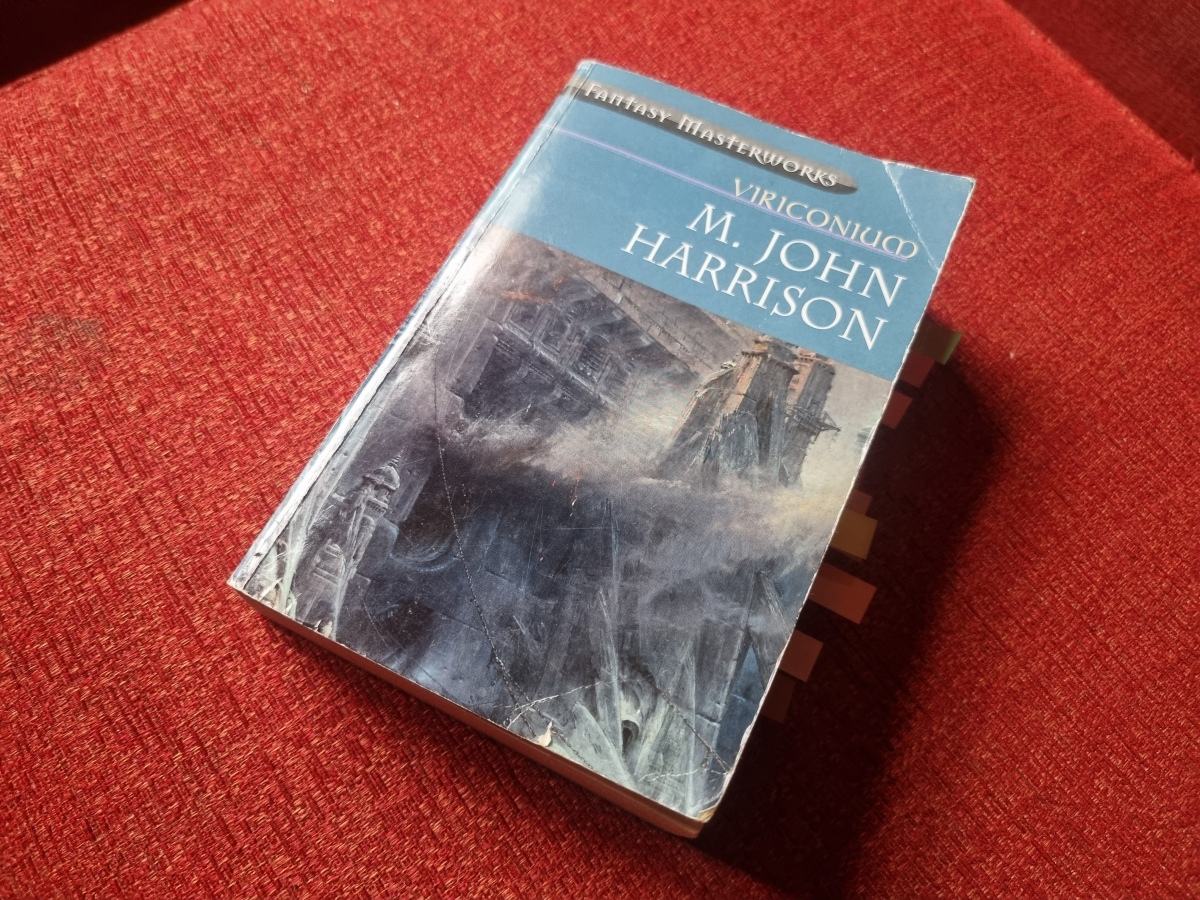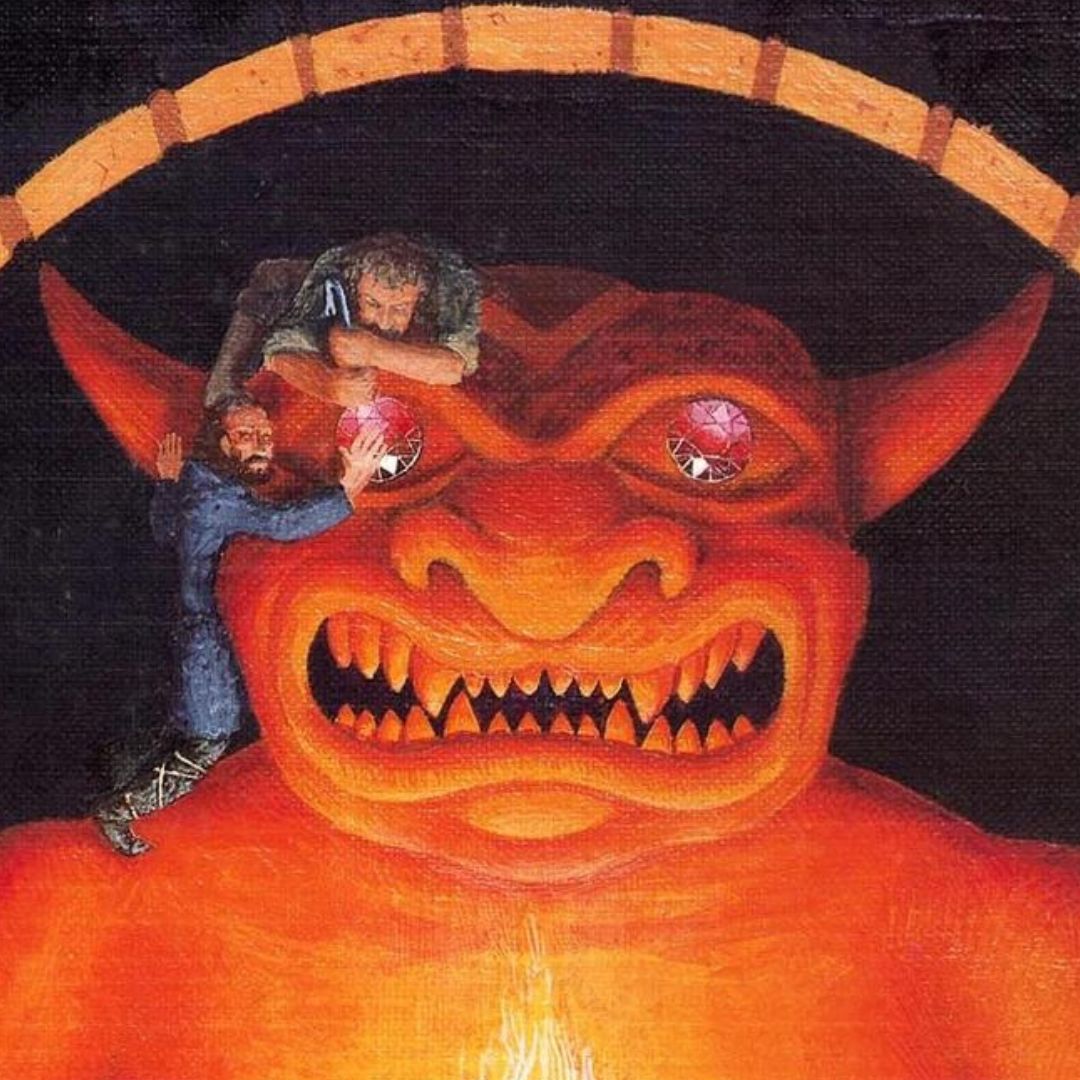M. John Harrison is one of those writers that I knew on paper I should fall in love with but hadn’t properly tried. Up until last year I’d been a big fan of his blog and his tweets but hadn’t read much of his fiction other than The Centauri Device. Then I got gifted a copy of Wish I Was Here and couldn’t help but devour it over the course of a couple of afternoons. (I reviewed it here.)
I was sold on M. John Harrison, so I decided to finally get started with the Fantasy Masterworks omnibus of Viriconium stories that I bought myself last year.
It’s an incredibly varied body of work with a lot to offer, and that asks a lot of questions. At no point did Harrison condescend to my expectations. Not every story hits, but that’s as much down to my reading comprehension as it is anything else, I think. I imagine these stories would be similarly rich on re-reading as Gene Wolfe’s New Sun books are supposed to be.
As has become my habit with these collections and anthologies I end taking notes story by story. I’ll post those raw notes, slightly edited, below the break, and then continue my discussion after.
Viriconium Knights
Why do I get the feeling that the tapestry is obliquely showing me important plot points?
The Pastel City
Like a heroic fantasy adventure inside a T.S. Eliot poem. The vibe here is impeccable. Harrison really goes out of his way to portray a world being scoured by a wind only moving in one direction; capital T Time, before pulling the rug and demonstrating that even at the end of Time, change is possible, is in fact the only constant. I think writing a fantasy novel about a swordsman who refuses to name his sword is hilarious. I just love the way he writes – I love the vocabulary, I love the odd choices of words. Gene Wolfe uses a similar technique in The Book of the New Sun. If you want to make it strange, writing about it strangely will go a long way.
Lord of Misrule
You don’t have to go to the end of time to meet sad people full of memories.
Strange Great Sins
Strange indeed. Is there a greater sin than not becoming yourself?
A Storm of Wings
Even sadder and more elegiac than usual. I miss tegeus-Cromis. So do a lot of people. The world, failing to end, undergoes a mutation. Filled with weird architecture you’ll struggle to imagine.
The Dancer from the Dance
Weird things happening on the heath.
The Luck in the Head
I could bound myself in a nutshell, and count myself king of infinite space, were it not that I have bad dreams.
The Lamia & Lord Cromis
Fate exists and you could not possibly guess at it.
In Viriconium
We spend more time in Viriconium than in any other story, and what a run down, claustrophobic place it is.
A Young Man’s Journey to Viriconium
You always suspected that Viriconium could be anywhere or anywhen.
I noticed as I was reading these stories that I was tracing the dying earth subgenre of SFF backwards. Or science fantasy, if you wanna call it that. I read The Book of the New Sun a few years ago and had never read anything like it, but knew you could follow it back to Jack Vance and The Dying Earth. The thread runs through Viriconium.
Opening this collection with Viriconium Knights is a smart move, I think. It drops you right it and disorients the hell out of you in terms of the setting, the characters, the way people view the world and how they speak to each other. It’s a concentrated hit. I didn’t understand the significance of the metal bird at the time, but having read Wolfe and been annoyed with myself at totally missing the significance of Dr. Talos’ play in Claw of the Conciliator, I was primed when the old man showed Ignace Retz the tapestry. Re-reading it quickly as I write this, it is a terrible echo, ever so sad; the first time I just nodded my head and knew what to expect.
I don’t know if Harrison arranged the stories or if that choice was made by an editor, but I think it’s significant that the stories from Viriconium Nights were broken up and arranged around the three novels, and not put in as their own block in the same order as published. Viriconium Knights would have one effect reading it after tegeus-Cromis has departed the stage, a nice little callback, do you remember that character? He was swell, wasn’t he? Placing it here, first, an echo of a thing that hasn’t happened yet, deprives you of that feeling of warmth and just highlights the disconnect, the instability of time and identity within these stories.
If The Pastel City was the only Viriconium thing then it would stand very well on its own as a great novel and fine addition to the genre. It’s an epic adventure story that subverts as many ideas and tropes inherent to epic adventure stories as it can, and even has some horror elements. (Thinking about it a lot of these stories have horror elements.) It’s a quest narrative where the quest only obliquely gets fulfilled and the hero is a master swordsman who refuses to name his sword and prefers to think of himself as a poet. The novel is written like the novelist prefers to think of himself as a poet. I mentioned it above, that using weird, archaic language can create that sense of strangeness.
(This extends even to the colours. I learned so many new words for colours reading these stories. Make it new!)
I just came across (here) an old essay of Harrison’s on the idea of worldbuilding. I think this quote is particularly edifying;
Worldbuilding numbs the reader’s ability to fulfil their part of the bargain
Harrison is writing a kind of post-structuralist fantasy, writing a constantly shifting city into existence by relying on the constant shift of language, asking the reader to do a lot of the work knowing full well every reader “reads” a different text into existence.
In Wish I Was Here, Harrison talks a lot about T.S. Eliot – I thought as I was reading the Viriconium stories that it was like a fantasy novel set inside an Eliot poem, but it goes deeper than that imagery. Harrison is as disobliging as Eliot. Eliot expects you to be familiar with so much stuff outside of his text to be able to fully grok it, Harrison does likewise. Harrison even quotes directly from The Waste Land without citing it, a few times actually, in much the same way Eliot doesn’t let you know when he’s copped something from Fraser, or Shakespeare. It’s poetry, innit.
Which is all to say that I adored The Pastel City, that if you were writing a fantasy novel just for me, just to appeal to my own interests and predilections, you would write The Pastel City.
The short stories that in this collection begin to serve as connective tissue are even more oblique, and I’m going to have to re-read them, I think, to have the same relationship with them that I developed with the novels. Some of the imagery starts repeating, like the Mari Lwyd.
A Storm of Wings is an odd one. In a world that is kind of already post-apocalyptic, but has reached a kind of equilibrium, what does the end of the world look like? It’s something totally alien, totally unimaginable, and it’s far enough in the future that our hero, tegeus-Cromis, has passed, and we must deal with it ourselves. A lot of the characters are heard aloud wishing for the return of their poet-cum-swordmaster in a way that probably echoes what the general reader is thinking. Instead we’re given; a rogue, a person who has been reawakened after millennia and is losing their grip on reality, a person who has been reawakened after millennia and *has* lost their grip on reality, and Tomb the dwarf, so that at least we’re not totally alienated, because despite me using words like “post-structuralist” to describe these stories, they are still stories, and Harrison knows what he is doing.
Harrison isn’t too arch to give us what we want, he just isn’t gonna do it in a straightforward way. The Lamia & Lord Cromis is another quest narrative, because that’s the kind of context that tegeus-Cromis belongs in. Lords of his house are fated to have to find and slay a rare beast, the eponymous Lamia. He does, eventually, do this, but it doesn’t bring him the fulfilment he expects, and I think him losing a ring in the same swamp that he loses one of Queen Jane’s in The Pastel City is interesting. tegeus-Cromis is directly engaging with his fate in this story, but not in the way he thinks.
(I just want to point out that even in giving us what we want, Harrison doesn’t. tegeus-Cromis spends a lot of The Pastel City brooding over his dead sister, in what I imagine might be a reference to Elric, but Harrison doesn’t use the prequel story to show us that loss, or bring tegeus-Cromis’ sister on stage for cheap dramatic irony. Remarkable restraint.)
By this point, and leading into the next novel, I was really noticing what Harrison wasn’t showing us, what he refuses to explain. There is plenty of advanced technology like airships, power armour, and laser swords, that he doesn’t explain, and doesn’t have the characters theorise about in-text either. The stuff just is, like stuff in real life just is. The way he describes the radiation from these technologies is cool (again, he’s not *against* the reader, he’s just not doing it all for them), they give off motes of white and purple light. In Viriconium, the last Viriconium novel, has a plague that is never explained, only its effects shown, that of sapping the will, the creative energy, the life force, of the city.
I actually had a moment reading this one where I thought, “I wonder what it’s like to live through a plage?” It took me a few moments, but I realised I had. And it had had a similar sapping effect on my energies, my life force. I know some people managed to have incredibly creative quarantines; I felt like such a dick because I didn’t. On paper it sounded perfect. My wages were getting (mostly) paid, and I had to stay home. The perfect time to work on that novel. I ground away at it and just felt miserable. None of it came easy. I kept a journal on and off. I’m glad I tried to keep myself busy and have some material to show for it, but it’s hard to look back at it as a particularly fruitful period.
(“Why won’t Harrison explain the plague?” I wondered to myself, as if anyone ever fully explained COVID.)
The protagonist, Ashlyme, a painter, has a friend who is also an artist and who is suffering from the plague. Ashlyme recognises his friend, Audsley King, as a great painter, but struggles to understand her recent work or why she choses to wallow in the plague zone instead of getting out and lapping up the adulation she surely deserves. Audsley has no interest in the praise of people she does not respect. This friction animatesthe whole story and the plague is just a backdrop. The stuff with the secret police, and the twins; I’m sure they represent the city, but otherwise am having trouble reconciling that subplot with the story as whole. Which might be the point. Art has contradictions and unreconcilable parts. Does some of this speak to Harrison’s attitude to the Viriconium stories as a whole? I think so, at least a bit.
The last story, A Young Man’s Journey to Viriconium, is a gear shift, set as it is in our world, among our people, some of whom have been to Viriconium before, some of whom want to visit for the first time. It’s an interesting contrast – what makes one story set in grimy cafes with a cast of weird people a fantasy and what makes another story set in grimy cafes among weird people not a fantasy story? Is it just the names? Some pretty weird names in this one, but then some of it takes place in York. Is Viriconium a place or a state of mind? I don’t know how I feel about this story, haven’t come to a nice conclusion. I just have questions and ideas I’ll be happy to think about every now and again until I eventually re-read these stories and maybe glean a bit more.
I’ve always enjoyed the modernist bent in SFF, the New Wave stuff, the exploration of inner space. Having read this and The Book of the New Sun, I’m thinking about how some of those other modernist ideas and ways of working leaked into the fantasy side of SFF, as a way of providing a kind of jungle gym for the reader’s mind. I came away from Viriconium with a lot of things to think about and a huge list of vocabulary to look up.
I love a book where I can feel myself becoming a better writer as I read it. The way Harrison constructs his worlds and stories looks so maximalist, and on closer inspection is so deliberate and restrained. Sometimes there is an impulse to explain every cool idea you have, and it is so satisfying to be trusted as a reader to fill in gaps, to be left space enough for a world to grow in me. Viriconium is ever changing in the stories, and is ever changing in my own mind and in the minds of everyone else who reads it.
Viriconium!







You must be logged in to post a comment.